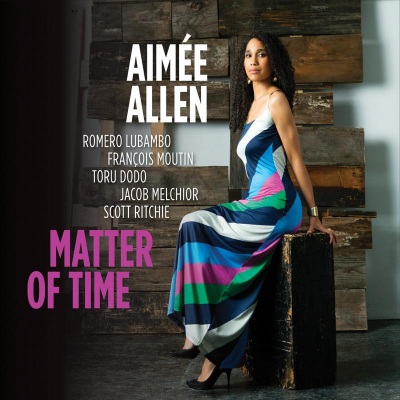
Matter of Time
Aimée is accompanied by an incredible cast of musicians, including special guest Romero Lubambo, the Grammy nominated master of Brazilian rhythm. With Romero on four selected tracks, bassist Scott Ritchie on one of them, and a rhythm section comprised of François Moutin, Toru Dodo, and Jacob Melchior on nine other tracks, vocal jazz is taken on new journeys, soulful original compositions deliver depth of meaning, and standards are given new life. Special Guest Romero Lubambo This project began when Romero and Aimée met in New York, and like many a young singer, Aimée professed her admiration and desire to sing with Romero. After hearing Aimée’s last release, Winters & Mays (Azuline), Romero agreed. From the first velvet whispers of his sumptuous harmonies, Romero’s presence on the album shines like gold in sunlight. His tight, harmonically rich rhythmic melds with Aimée’s hyper-expressive phrasing to flawless effect. It is a duo that leaves you wanting more. Romero plays two of Aimée’s original compositions, the intimate trio version of the title track, Matter of Time, and Aimée’s well-loved francophone bossa, Qu’est-ce qu’on est bien ici, a favorite of her French and international audiences since it’s inclusion on her 2007 release l’Inexlicable (Vivid Sound, Japan / Schubert - Poland). Romero also lends his definitive style to the bossa nova classics The Island and Corcovado. The Songs Because of its personal significance to Aimée, but also signaling a journey to source, the title track Matter of Time appears twice on the album, bookending the tracks. First, in intimate trio format, with the solid accompaniment of Romero and Scott Richie, and later as a more uptempo version, with the quartet. Matter of Time is Aimée’s clever driving jazz ode to finding patience when things may seem out of sync. “If we can wait”, the song says, “just believe and not anticipate/ maybe it will come on its own/ maybe it will come to be known.” The second version, the album’s closing track, is a smart, rousing refrain that leaves listeners on a high note, bringing it home, as the lyric says. In between are several nods to the tradition, but with a twist, and audacious original songs listeners can sink their teeth into. On the side of tradition, a daring My Romance in 5 begins with the witty rhythmic repartee of Aimée and François Moutin alone. The song then tears off in flight with the quartet. (Speaking of witty repartee, see Aimée and François performing duo on her website at www.aimeeallenmusic.com/videos). Close Your Eyes is a festival of rhythm and boldness, cleverly omitting piano and featuring Aimée accompanied only by drum and bass. Rounding out the standards, Aimée’s hip bluesy interpretation of Out of Nowhere kicks off swinging hard, showcasing playful improvisations by François and Toru. A compositional gem, Aimée’s original song Soul Cargo is the poetic retelling of her first trip to Africa, as both a physical and spiritual journey. The song begins with François Moutin’s searing baseline, and the journey begins. An interactive vocal/piano improv and a modulation accompany a lyric that speaks of a mystical pilgrimage through space and time to find honored ancestors (“Yesterday returns tomorrow”). Soul Cargo soars, and keeps a bluesy groundedness all at once. But songs about transcendant love ground this project in another deep space. Aimée’s delicate and honest Sometimes You Just Know is a tribute to what words cannot say. She delivers it with a knowing passion, and the quartet follows suit. It already seems a classic, with a message for the ages to which everyone can relate: “sometimes you just know / what you're never told / words cannot compete / words are incomplete.” In The Space Between, Aimée takes Pat Metheny’s moving ballad, The Road to You, and with great simplicity and elegance tells to the story of lovers apart: “the space between/ us may be far/ and still always I'll be/ where you are”. Harmonics from François’ bass strings and Toru’s lilting piano add an eerie beauty to this haunting melody. François and Aimée’s composition In the Name of Love reaches new heights as it tells the lengths lovers will go for love. Form follows function as Aimée’s voice covers impressive ground over wide intervals, and the rhythmic is lulled by the subtle waves of Toru’s chords on the Rhodes. The forward-looking love anthem, New Day, was written by guitarist David Allen, Aimée’s brother. With a subtle latin feel, and a slight pop sensibiltiy, it adds a welcome playful, though still sensual, note to the album, and speaks of love at last found, and forever to be cherished. The Players The dazzling players on Matter of Time are vibrant and energetic, with a clear interplay that keeps each musician inventing. In this rhythmic, conversations are being had. Toru Dodo shows extraordinary range and intelligence with daring choices. He is delicate and beautiful one minute and avant garde the next. François Moutin contributes his signature unparalleled virtuosity, and in ever-more inventive baselines, seems to both hold it down and elevate it at once. Jacob Melchior proves sensitive and reactive as a keeper of time, bringing taste and moving dynamism to the drums. And Scott Richie expertly finds the pocket and foundation for Aimée and Romero on the title track. But the emotionally expressive colors of Aimée’s voice tie everything together, and give this personal and authentic album it’s heart and soul.
